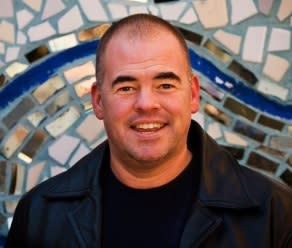Bestselling author explores teen anguish
For Matthew Quick - bestselling author of The Silver Linings Playbook, the novel on which the Academy Award-winning film was based - the process of "coming out" about his mental illness has been an inescapable consequence of choosing to write for a living.
"There was definitely a rocky transition from the ages of 16 to 30 - there were some really dark times. I was not violent, but I was somebody who had feelings of not being able to fit himself into the world," he says. "It wasn't until I started writing that I felt there was a place for me. I always say writing saved me, and I do mean that - literally and metaphorically."
As Quick attests, his books are not autobiographical as such; rather, it is his own experience which has equipped him to write the stories and characters that populate his numerous novels.
"I sit down and try to create characters which are real and authentic and I think I can only do that if I know how those characters feel. I write about characters which are often on the fringe and who feel left out because a lot of times in my own life that's how I felt," he says. "I never sat down in my late 20s and went 'I'm going to be the mental health guy'. I just started writing about what was on my mind. It's therapy for me."
While writing is a very personal process for Quick, he says the aftermath of the hugely successful Silver Linings film revealed to him the powerful impact of his stories on readers.
"As I travelled around promoting Silver Linings so many people came up to me and said 'thank you for talking openly about mental health'," he says. "These were people who weren't necessarily fans of literature or storytelling, they were just really happy that there was more talking about mental health.
"That happened to me all across the country, over and over, and I realised that the success of Silver Linings transcended sales or my career or anything else. It became a necessary force," he continues. "I take that very seriously, not only to remind myself that it's a gift and I am very lucky to be in this situation, but also to do the best with it because I am in a position to talk about things like mental health and to give a voice to so many people who don't have a voice."
Quick still seeks out stories people can connect to. Forgive Me, Leonard Peacock targets young adults in particular. The novel focuses on the titular Leonard Peacock, a deeply troubled high school student with a P-38 handgun who plans to murder his former best friend before killing himself.
While Quick is not the first writer to present readers with a glimpse inside the mind of a teenage gunman, his novel is made all the more troubling given the recent rash of high-profile shootings in the US, including the Sandy Hook massacre which claimed the lives of 20 children and six adults last December.
Although Leonard's story was conceived long before Sandy Hook, Quick admits the infamous Columbine High School massacre "was on my mind" while crafting the novel, though greater inspiration came from the teenagers he encountered during his pre-novelist years working as an English teacher in New Jersey.
"None of the students where I was were bringing guns to school or anything of that level, but one thing I did notice was that often some of the best and brightest were harbouring the deepest, darkest secrets," he says. "I really struggled with it because I was trying to teach these kids to do their best but I felt that while we were pushing them to look great on a resume or on paper we weren't taking care of what was going on underneath the surface."
It is precisely these young adults whom Quick hopes to reach out with Forgive Me, Leonard Peacock, a novel which he hopes may help some adolescent readers navigate their way into adulthood.
"When I was a teenager struggling with these things I always turned to literature because I felt as though I could read about other people experiencing things that I had no knowledge about but I was worried about," he says. "I hope that all my books make people out there feel as though they are not alone and, especially with Leonard Peacock, that there are lighthouse keepers in the world who are shining light and you can find them."



